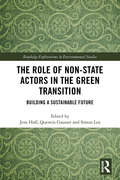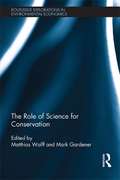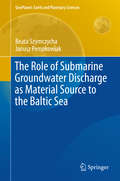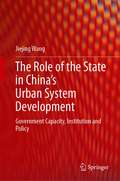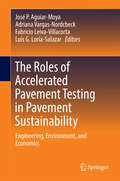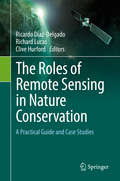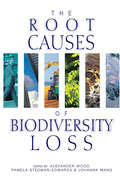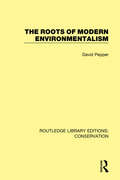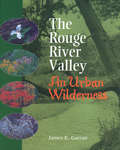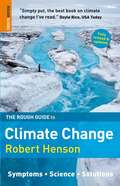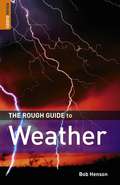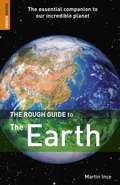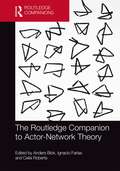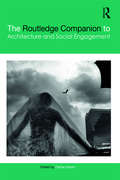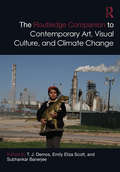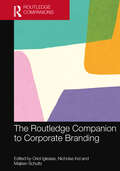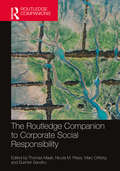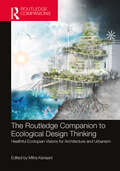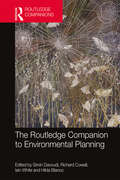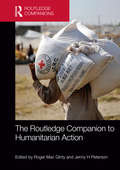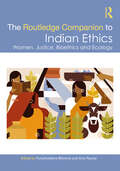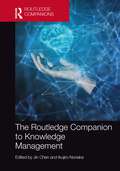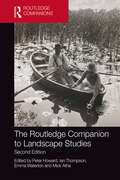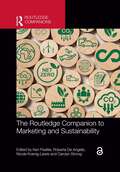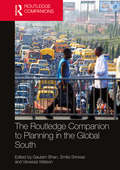- Table View
- List View
The Role of Non-State Actors in the Green Transition: Building a Sustainable Future (Routledge Explorations in Environmental Studies)
by Jens Hoff Quentin Gausset Simon LexThis book argues that there is no way to make progress in building a sustainable future without extensive participation of non-state actors. The volume explores the contribution of non-state actors to a sustainable transition, starting with citizens and communities of different kinds and ending with cities and city-networks. The authors analyse social, cultural, political and economic drivers and barriers for this transition, from individual behaviour to structural restraints, and investigate interplay between the two. Through a series of wide-ranging case studies from the UK, Australia, Germany, Italy and Denmark, and a number of comparative case studies, the volume provides an empirically and theoretically robust argument that highlights the need to develop, widen and scale up collective action and community-based engagement if the transition to sustainability is to be successful. This book will be of great interest to students and scholars of climate change, sustainability and environmental policy.
The Role of Science for Conservation (Routledge Explorations In Environmental Economics Ser. #34)
by Mark Gardener Matthias WolffThe book integrates the knowledge and reflections of 30 scientists, of which many have dedicated a substantial part of their professional life to the Galapagos archipelago, to the conservation of its biodiversity and to the sustainable management of its resources. The book can be considered a milestone on the way to the successful conservation and sustainable development of this unique world heritage site. .
The Role of Submarine Groundwater Discharge as Material Source to the Baltic Sea
by Janusz Pempkowiak Beata SzymczychaThe book provides a review of experimental methods and presents the worldwide newest literature regarding chemical substances fluxes via submarine groundwater discharge (SGD). Thus, the book characterizes both the distribution of chemicals in groundwater impacted areas in the Baltic Sea and their fluxes via SGD to the Baltic Sea. This book presents the state of art regarding the SGD and detailed studies on SGD characterization in the Baltic Sea. The Baltic Sea is an example of a region highly influenced by a variety of human activities that affect the ecosystem. It is shown that SGD has been proven to be one of the important sources introducing dissolved substances into the Baltic Sea. The loads of chemical substances delivered to the Baltic sea with SGD have not been quantified so far.
The Role of the State in China’s Urban System Development: Government Capacity, Institution and Policy
by Jiejing WangThis book investigates how the state intervenes in the urban system in China in the post-reform period. To do so, it constructs a conceptual framework based on the perspective of political hierarchy, suggesting that the state power is hierarchically organized in China’s urban system, leading to variations in urban government capacities among cities. The book reveals that the state has largely achieved the goal of its national urban system policy to “strictly control the scale of large cities” resulting in the under-development of the large cities if they are mainly developing according to the market force. However, this has become less influential with the advances toward a market economy. Further, state regulation and policies have reduced the gaps between cities at the top and bottom of the urban hierarchy. The book argues that the Urban Administrative System (UAS) is an important tool for the state to regulate urban system development, and the administrative level has a significant effect on urban growth performance. It contends that China’s urban system is strongly shaped by the omnipresent state through the UAS, which hierarchically differentiates between the urban growth processes. By controlling the administrative-level upgrading process, the state can prevent the size and number of cities from increasing too rapidly.This theoretical and empirical enquiry highlights the fact that the hierarchical power relations among cities and the resulting variations in urban government capacities are the key to understanding the role of the state in China’s urban system development in the post-reform period.
The Roles of Accelerated Pavement Testing in Pavement Sustainability
by José P. Aguiar-Moya Adriana Vargas-Nordcbeck Fabricio Leiva-Villacorta Luis G. Loría-SalazarThis compendium gathers the latest advances in the area of Accelerated Pavement Testing (APT), a means of testing full-scale pavement construction in an accelerated manner for structural deterioration in a very short term. Compiling novel research results presented at the 5th International Conference on Accelerated Pavement Testing, San Jose, Costa Rica, the volume serves as a timely and highly relevant resource for materials scientists and engineers interested in determining the performance of a pavement structure during its service life (10+ years) in a few weeks or months.
The Roles of Remote Sensing in Nature Conservation
by Clive Hurford Richard Lucas Ricardo Díaz-DelgadoThe book will provide an overview of the practical application of remote sensing for the purposes of nature conservation as developed by ecologists in collaboration with remote sensing specialists, providing guidance on all phases from the planning of remote sensing projects for conservation to the interpretation and validation of the images.
The Root Causes of Biodiversity Loss
by Alexander Wood Pamela Stedman-Edwards Johanna MangThe world is losing species and biodiversity at an unprecedented rate. The causes go deep and the losses are driven by a complex array of social, economic, political and biological factors at different levels. Immediate causes such as over-harvesting, pollution and habitat change have been well studied, but the socioeconomic factors driving people to degrade their environment are less well understood. This book examines the underlying causes. It provides analyses of a range of case studies from Brazil, Cameroon, China, Danube River Basin, India, Mexico, Pakistan, Philippines, Tanzania and Vietnam, and integrates them into a new and interdisciplinary framework for understanding what is happening. From these results, the editors are able to derive policy conclusions and recommendations for operational and institutional approaches to address the root causes and reverse the current trends. It makes a contribution to the understanding of all those - from ecologists and conservationists to economists and policy makers - working on one of the major challenges we face.
The Roots of Modern Environmentalism (Routledge Library Editions: Conservation #6)
by David PepperOriginally published in 1984, The Roots of Modern Environmentalism provides a historical, philosophical and ideological background to environmentalism. Topics covered include, the roots of technological environmentalism, the medieval cosmology and Bacon’s philosophy, the non-scientific roots of ecological environmentalism, such as Romanticism and its scientific roots in the theories of Malthus and Darwin. The Marxist perspective on Nature is also discussed. The concluding chapter is a criticism of education which challenges its usefulness as an agent of socio-economic change. This book will be of interest to academics and students of environmentalism and geography.
The Rouge River Valley: An Urban Wilderness
by James E. GarrattThe Rouge River Valley, eleven thousand acres of urban wilderness, is a unique, yet very fragile and transient natural phenomenon existing within the confines of a major North American city, Toronto. Fed by the Oak Ridges Moraine, the Rouge river system has, over generations of time, cut its identity into the land, shaping the habitat for a multitude of lifeforms, many of which are now either threatened or gone. Author James E. Garratt, a seasoned environmentalist, shares two decades of personal observation and ecological study to reveal the richness and flow of seasonal changes in this exceptional urban park. This "portrait" of a year in the Rouge Valley explores not only the diversity of life in its natural habitat but also the impact of urban sprawl and the inevitable conflict with development. Is it possible to be a true naturalist "grounded" in a modern city? The words of Ian McHarg, an urban planner, hold true: "We need nature as much in the city as in the country."
The Rough Guide to Climate Change
by Duncan Clark Robert HensonThe Rough Guide to Climate Change gives the complete picture of the single biggest issue facing the planet today. Cutting a swathe through scientific research and political debate, this completely updated 2nd edition lays out the facts and assesses the options- global and personal- for dealing with the threat of a warming world. The guide looks at the evolution of our atmosphere over the last 4.5 billion years and what computer simulations of climate change reveal about our past, present, and future. This updated edition includes new information from the 2007 report from the International Panel on Climate Change and an updated politics section to reflect post-Kyoto developments. Discover how rising temperatures and sea levels, plus changes to extreme weather patterns, are already affecting life around the world. The guide unravels how governments, scientists and engineers plan to tackle the problem and includes in-depth information and lifestyle tips about what you can do to help.
The Rough Guide to Weather
by Robert Henson"If warm air raises, why is Everest so cold?" The author of The Rough Guide to Climate Change provides a primer on weather-related phenomena and behind-the-scenes looks at how forecasts are made. Among the annotated resources listed in this update of the 2002 edition are special interest Websites and blogs, and government weather agencies worldwide. Annotation ©2008 Book News, Inc., Portland, OR (booknews.com)
The Rough Guide to the Earth
by Martin InceA London-based science journalist explains the origins of the home planet, how the Earth changes and affects us, and in turn, how humans are altering the third rock from the Sun. The accessible guide includes interesting boxed information (e.g., "How to start an ice age"), numerous color images, and annotated resources. Annotation ©2008 Book News, Inc., Portland, OR (booknews.com)
The Routledge Companion to Actor-Network Theory
by Celia Roberts Anders Blok Ignacio FariasThis companion explores ANT as an intellectual practice, tracking its movements and engagements with a wide range of other academic and activist projects. Showcasing the work of a diverse set of ‘second generation’ ANT scholars from around the world, it highlights the exciting depth and breadth of contemporary ANT and its future possibilities. The companion has 38 chapters, each answering a key question about ANT and its capacities. Early chapters explore ANT as an intellectual practice and highlight ANT’s dialogues with other fields and key theorists. Others open critical, provocative discussions of its limitations. Later sections explore how ANT has been developed in a range of social scientific fields and how it has been used to explore a wide range of scales and sites. Chapters in the final section discuss ANT’s involvement in ‘real world’ endeavours such as disability and environmental activism, and even running a Chilean hospital. Each chapter contains an overview of relevant work and introduces original examples and ideas from the authors’ recent research. The chapters orient readers in rich, complex fields and can be read in any order or combination. Throughout the volume, authors mobilise ANT to explore and account for a range of exciting case studies: from wheelchair activism to parliamentary decision-making; from racial profiling to energy consumption monitoring; from queer sex to Korean cities. A comprehensive introduction by the editors explores the significance of ANT more broadly and provides an overview of the volume. The Routledge Companion to Actor-Network Theory will be an inspiring and lively companion to academics and advanced undergraduates and postgraduates from across many disciplines across the social sciences, including Sociology, Geography, Politics and Urban Studies, Environmental Studies and STS, and anyone wishing to engage with ANT, to understand what it has already been used to do and to imagine what it might do in the future.
The Routledge Companion to Architecture and Social Engagement
by Farhan KarimSocially engaged architecture is a broad and emerging architectural genre that promises to redefine architecture from a market-driven profession to a mix of social business, altruism, and activism that intends to eradicate poverty, resolve social exclusion, and construct an egalitarian global society. The Routledge Companion to Architecture and Social Engagement offers a critical enquiry of socially engaged architecture’s current context characterized by socio-economic inequity, climate change, war, increasing global poverty, microfinance, the evolving notion of professionalism, the changing conception of public, and finally the growing academic interest in re-visioning the social role of architecture. Organized around case studies from the United States, Brazil, Venezuela, the United Kingdom, South Africa, Rwanda, Burkina Faso, Nigeria, Nepal, Pakistan, Iran, Thailand, Germany, Australia, Taiwan, and Japan the book documents the most important recent developments in the field. By examining diverse working methods and philosophies of socially engaged architecture, the handbook shows how socially engaged architecture is entangled in the global politics of poverty, reconstruction of the public sphere, changing role of the state, charity, and neoliberal urbanism. The book presents debates around the issue of whether architecture actually empowers the participators and alleviates socio-economic exclusion or if it instead indirectly sustains an exploitive capitalism. Bringing together a range of theories and case studies, this companion offers a platform to facilitate future lines of inquiry in education, research, and practice.
The Routledge Companion to Contemporary Art, Visual Culture, and Climate Change (Routledge Art History and Visual Studies Companions)
by Subhankar Banerjee T. J. Demos Emily Eliza ScottInternational in scope, this volume brings together leading and emerging voices working at the intersection of contemporary art, visual culture, activism, and climate change, and addresses key questions, such as: why and how do art and visual culture, and their ethics and values, matter with regard to a world increasingly shaped by climate breakdown? Foregrounding a decolonial and climate-justice-based approach, this book joins efforts within the environmental humanities in seeking to widen considerations of climate change as it intersects with social, political, and cultural realms. It simultaneously expands the nascent branches of ecocritical art history and visual culture, and builds toward the advancement of a robust and critical interdisciplinarity appropriate to the complex entanglements of climate change. This book will be of special interest to scholars and practitioners of contemporary art and visual culture, environmental studies, cultural geography, and political ecology.
The Routledge Companion to Corporate Branding (Routledge Companions in Marketing, Advertising and Communication)
by Majken Schultz Nicholas Ind Oriol IglesiasThis companion is a prestige reference work that offers students and researchers a comprehensive overview of the emerging co-created, multi-stakeholder, and sustainable approach to corporate brand management, representing a paradigm shift in the literature. The volume contains 30 chapters, organised into 6 thematic sections. The first section is an introductory one, which underscores the evolution of brand management thinking over time, presenting the corporate brand management field, introducing the current debates in the literature, and discussing the key dimensions of the emerging corporate brand management paradigm. The next five sections focus in turn on one of the key dimensions that characterize the emerging approach to corporate brand management: co-creation, sustainability, polysemic corporate narratives, transformation (history and future) and corporate culture. Every chapter provides a deep reflection on current knowledge, highlighting the most relevant debates and tensions, and offers a roadmap for future research avenues. The final chapter of each section is a commentary on the section, written by a senior leading scholar in the corporate brand management field. This wide-ranging reference work is primarily for students, scholars, and researchers in management, marketing, and brand management, offering a single repository on the current state of knowledge, current debates, and relevant literature. Written by an international selection of leading authors from the USA, Europe, Asia, Africa, and Australia, it provides a balanced, authoritative overview of the field and convenient access to an emerging perspective on corporate brand management.
The Routledge Companion to Corporate Social Responsibility (Routledge Companions in Business, Management and Marketing)
by Thomas Maak, Nicola M. Pless, Marc Orlitzky, and Sukhbir SandhuWhile the concept and domain of Corporate Social Responsibility (CSR) are not new—its beginnings can be tracked back to the 1960s—its scope, urgency, and relevance have shifted dramatically in recent years. CEO responses show that the majority of business leaders understand that they operate in an environment of contested values and that stakeholders expect companies to do better and more. However, many corporate incentive systems are not in sync with societal norms and expectations. Moreover, "grand challenges" such as climate change and global pandemics and growing interconnectedness shed light on the fault lines of value creation through complex supply chain systems, exposing unacceptable working conditions, modern slavery, and the environmental consequences of highly distributed production at any cost. As a consequence, corporate social responsibility has become a widely accepted common denominator of the role and responsibilities of business in society, ranging from core functions such as health, safety, and environment standards, to governance and recognition of stakeholders, supply chain design, and corporations’ stand on climate change and its responsibility to future generations. This volume assembles state-of-the-art scholarship from leading scholars in the field and enables a "full range view" of CSR, from its roots, normative foundations, and institutional perspectives to matters of stakeholding, the global value chain, social innovation, and future directions. The Routledge Companion to Corporate Social Responsibility represents a prestige reference work providing an overview of the subject area of CSR for academics, researchers, postgraduate students, as well as reflective practitioners.
The Routledge Companion to Ecological Design Thinking: Healthful Ecotopian Visions for Architecture and Urbanism
by Mitra KanaaniThis companion investigates the ways in which designers, architects, and planners address ecology through the built environment by integrating ecological ideas and ecological thinking into discussions of urbanism, society, culture, and design. Exploring the innovation of materials, habitats, landscapes, and infrastructures, it furthers novel ecotopian ideas and ways of living, including human-made settings on water, in outer space, and in extreme environments and climatic conditions. Chapters of this extensive collection on ecotopian design are grouped under five different ecological perspectives: design manifestos and ecological theories, anthropocentric transformative design concepts, design connectivity, climatic design, and social design. Contributors provide plausible, sustainable design ideas that promote resiliency, health, and well-being for all living things, while taking our changing lifestyles into consideration. This volume encourages creative thinking in the face of ongoing environmental damage, with a view to making design decisions in the interest of the planet and its inhabitants. With contributions from over 79 expert practitioners, educators, scientists, researchers, and theoreticians, as well as planners, architects, and engineers from the U.S., Canada, Europe, and Asia, this book engages theory, history, technology, engineering, and science, as well as the human aspects of ecotopian design thinking and its implications for the outlook of the planet.
The Routledge Companion to Environmental Planning (Routledge International Handbooks)
by Simin Davoudi Richard Cowell Iain White Hilda BlancoThis Companion presents a distinctive approach to environmental planning by: situating the debate in its social, cultural, political and institutional context; being attentive to depth and breadth of discussions; providing up-to-date accounts of the contemporary practices in environmental planning and their changes over time; adopting multiple theoretical and analytical lenses and different disciplinary approaches; and drawing on knowledge and expertise of a wide range of leading international scholars from across the social science disciplines and beyond. It aims to provide critical reviews of the state-of-the-art theoretical and practical approaches as well as empirical knowledge and understandings of environmental planning; encourage dialogue across disciplines and national policy contexts about a wide range of environmental planning themes; and, engage with and reflect on politics, policies, practices and decision-making tools in environmental planning. The Companion provides a deeper understanding of the interdependencies between the themes in the four parts of the book (Understanding ‘the environment’, Environmental governance, Critical environmental pressures and responses, and Methods and approaches to environmental planning) and its 37 chapters. It presents critical perspectives on the role of meanings, values, governance, approaches and participations in environmental planning. Situating environmental planning debates in the wider ecological, political, ethical, institutional, social and cultural debates, it aims to shine light on some of the critical journeys that we have traversed and those that we are yet to navigate and their implications for environmental planning research and practice. The Companion provides a reference point mapping out the terrain of environmental planning in an international and multidisciplinary context. The depth and breadth of discussions by leading international scholars make it relevant to and useful for those who are curious about, wish to learn more, want to make sense of, and care for the environment within the field of environmental planning and beyond.
The Routledge Companion to Humanitarian Action
by Roger Mac Ginty Jenny H PetersonThe Companion on Humanitarian Action addresses the political, ethical, legal and practical issues which influence reactions to humanitarian crisis. It does so by exploring the daily dilemmas faced by a range of actors, including policy makers, aid workers, the private sector and the beneficiaries of aid and by challenging common perceptions regarding humanitarian crisis and the policies put in place to address these. Through such explorations, it provides practitioners and scholars with the knowledge needed to both understand and improve upon current forms of humanitarian action. The Companion will be of use to those interested a range of humanitarian programmes ranging from emergency medical assistance, military interventions, managing refugee flows and the implementation of international humanitarian law. As opposed to addressing specific programmes, it will explore five themes seen as relevant to understanding and engaging in all modes of humanitarian action. The first section explores varying interpretations of humanitarianism, including critical historical and political-economic explanations as well as more practice based explorations focused on notions needs assessments and evaluation. Following this, readers will be exposed to the latest debates on a range of humanitarian principles including neutrality and sovereignty, before exploring the key issues faced by the main actors involved in humanitarian crisis (from international NGOs to local community based organizations). The final two sections address what are seen as key dilemmas in regards to humanitarian action and emerging trends in the humanitarian system, including the increasing role of social media in responding to crises. Whilst not a ‘how to guide’, the Companion contains many practical insights for policy makers and aid workers, whilst also offering analytical insights for students of humanitarian action. Indeed, throughout the book, readers will come to the realization that understanding and improving humanitarian action simultaneously requires both active critical reflection and an acceptance of the urgency and timeliness of action that is required for humanitarian assistance to have an impact on vital human needs. Exploring a sector that is far from homogenous, both practitioners and scholars alike will find the contributions of this book offers them a deeper understanding of the motivations and mechanics of current interventions, but also insight into current changes and progress occurring in the field of humanitarian practice.
The Routledge Companion to Indian Ethics: Women, Justice, Bioethics and Ecology
by Purushottama Bilimoria Amy RaynerThis companion volume focuses on the application and practical ramifications of Indian ethics. Here Indian dharma ethics is moved from its preeminent religious origins and classical metaethical proclivity to, what Kant would call, practical reason – or in Aristotle’s poignant terms, ēhikos and phronēis –and in more modern parlance normative ethics. Our study examines a wide range of social and normative challenges facing people in such diverse areas as women’s rights, infant ethics, politics, law, justice, bioethics and ecology. As a contemporary volume, it builds linkages between existing theories and emerging moral issues, problems and questions in today’s India in the global arena. The volume brings together contributions from some 40 philosophers and contemporary thinkers on practical ethics, exploring both the scope and boundaries or limits of ethics as applied to everyday and real-life concerns and socio-economic challenges facing India in the context of a troubled globalizing world. As such, this collection draws on multiple forms of writing and research, including narrative ethics, interviews, critical case studies and textual analyses.The book will be of interest to scholars, researchers and students of Indian philosophy, Indian ethics, women and infant issues, social justice, environmental ethics, bioethics, animal ethics and cross-cultural responses to dominant Western moral thought. It will also be useful to researchers working on the intersection of Gandhi, sustainability, ecology, theology, feminism, comparative philosophy and dharma studies.
The Routledge Companion to Knowledge Management (Routledge Companions in Business, Management and Marketing)
by Jin ChenKnowledge when properly leveraged and harnessed contributes to effective organizational performance. How much an organization benefits from knowledge would depend on how well knowledge has been managed. There have been challenges to implementing knowledge management in today’s dramatically different world from before. This comprehensive reference work is a timely guide to understanding knowledge management. The book covers key themes of knowledge management which includes the basic framework of knowledge management and helps readers to understand the state of art of knowledge management both from the aspects of theory and practice, from the perspectives of strategy, organization, resources, as well as institution and organizational culture. This reference work reflects the increasingly important role of both philosophy and digital technologies in knowledge management research and practice. This handbook will be an essential resource for knowledge management scholars, researchers and graduate students.
The Routledge Companion to Landscape Studies (Routledge International Handbooks)
by Emma Waterton Ian Thompson Peter Howard Mick AthaThis new edition of The Routledge Companion to Landscape Studies contains an updated and expanded selection of original chapters which explore research directions in an array of disciplines sharing a concern for ‘landscape’, a term which has many uses and meanings. It features 33 revised and/or updated chapters and 14 entirely new chapters on topics such as the Anthropocene, Indigenous landscapes, challenging landscape Eurocentrisms, photography and green infrastructure planning. The volume is divided into four parts: Experiencing landscape; Landscape, heritage and culture; Landscape, society and justice; and Design and planning for landscape. Collectively, the book provides a critical review of the various fields related to the study of landscapes, including the future development of conceptual and theoretical approaches, as well as current empirical knowledge and understanding. It encourages dialogue across disciplinary barriers and between academics and practitioners, and reflects upon the implications of research findings for local, national and international policy in relation to landscape. The Companion provides a comprehensive and up-to-date guide to current thinking about landscapes, and serves as an invaluable point of reference for scholars, researchers and graduate students alike.
The Routledge Companion to Marketing and Sustainability (Routledge Companions in Marketing, Advertising and Communication)
by Roberta De Angelis Ken Peattie Carolyn Strong Nicole Koenig-LewisThis state-of-the-art handbook provides a comprehensive review of recent research and academic thought on the relationship between marketing and sustainability. It combines a ‘micro-marketing’ approach considering how to market more sustainable goods and services, with a more critical perspective considering the implications of our marketing systems for the future of the planet and humankind. It also balances a traditional socio-economic perspective on marketing with a physical systems perspective considering how the consequences of our consumption and production systems play out over time and space.Bringing together a range of leading international experts from more than a dozen countries, this unique collection addresses both the environmental side of the sustainability agenda, through topics such as product development, packaging and circular economy initiatives, and its social side through topics such as fair trade marketing, bottom-of-the-pyramid initiatives and marketing ethics. A range of key market contexts are discussed including food, mobility, tourism, luxury consumption and sports along with important developments in the field around social marketing, sustainable lifestyles, new information technologies and the need for better marketing of sustainability.Exploring how marketing can meet the challenge of the transition towards a more sustainable economy and a fairer society, this unique volume will be welcomed by researchers, students and practitioners from a variety of fields including marketing, business ethics, sociology and environmental studies.Chapter 23 of this book is freely available as a downloadable Open Access PDF at http://www.taylorfrancis.com under a Creative Commons Attribution (CC BY) 4.0 license.
The Routledge Companion to Planning in the Global South (Routledge International Handbooks)
by Smita Srinivas Vanessa Watson Gautam BhanThe Routledge Companion to Planning in the Global South offers an edited collection on planning in parts of the world which, more often than not, are unrecognised or unmarked in mainstream planning texts. In doing so, its intention is not to fill a ‘gap’ that leaves this ‘mainstream’ unquestioned but to re-theorise planning from a deep understanding of ‘place’ as well as a commitment to recognise the diverse modes of practice that come within it. The chapters thus take the form not of generalised, ‘universal’ analyses and prescriptions, but instead are critical and located reflections in thinking about how to plan, act and intervene in highly complex city, regional and national contexts. Chapter authors in this Companion are not all planners, or are planners of very different kinds, and this diversity ensures a rich variety of insights, primarily based on cases, to emphasise the complexity of the world in which planning is expected to happen. The book is divided into a framing Introduction followed by five sections: planning and the state; economy and economic actors; new drivers of urban change; landscapes of citizenship; and planning pedagogy. This volume will be of interest to all those wanting to explore the complexities of planning practice and the need for new theories of knowledge from which to draw insight to face the challenges of the 21st century.
